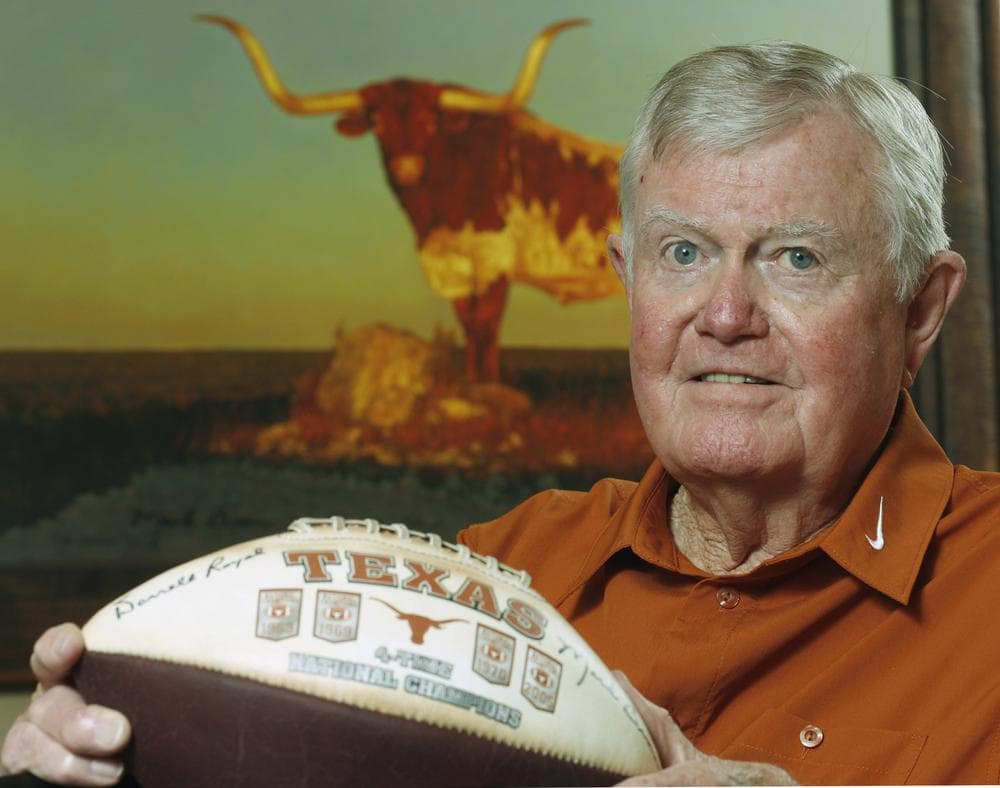Advertisement
Remembering Texas Football Coach Darrell Royal

Legendary University of Texas football coach Darrell Royal died Wednesday at the age of 88. During his 20 seasons as head coach, the Longhorns won three national championships and never had a losing season.
Royal took over the Texas program in 1957, just eight years after finishing his All-American football career as a player at Oklahoma.
“He never wanted to be a professional player or anything else, he wanted to coach at college and I think he was always looking for the right place to make his mark,” said John Wheat, a historian at the University of Texas, who co-authored Royal’s autobiography, Coach Royal. “He sort of had a reputation as a peripatetic wanderer, from Mississippi State to Washington to all over the place, but when that call came from Texas, I think he knew this was where he was going to make his mark.”
During his time at Texas, Royal and his staff pioneered the "wishbone" offense, which puts three backs behind the quarterback in a “Y” formation.
“At the time it was a groundbreaking innovation. Emory Bellard was his assistant coach who came up with the concept and Royal had been thinking of the same thing," Wheat said. "And it gave this tremendous triple option to the quarterback. Coaches like Bear Bryant lapped it up at Alabama and won a couple national championships using that wishbone formation, and it’s still in use today.”
Texas was slow to add African-American players to its roster. When the team eventually integrated in 1970, critics said Royal had been too slow to make the change.
“[The criticism] bothered him a lot and he knew that African-American players were being overlooked and that Texas would benefit realty from having them on their rosters,” Wheat said. “But he also knew about political realities and it really wasn’t his call, so to speak. Powers higher up than him that paid his salaries were still dragging their heels on this. And he was a patient man, but he really wanted to integrate before it actually happened.”
Advertisement
During Wheat’s interviews with Royal, he asked about some disagreements Royal had with higher-ups and political figures at Texas.
“Coach Royal asked me to turn my recorder off because he didn’t want to go on record badmouthing these people who were now dead and could no longer defend themselves. He paid me the personal courtesy of telling me everything I wanted to know, but not for the public record. And he had some pretty serious disputes with some powerful figures who disapproved of, for example, of his associating with Willie Nelson and all those pot-smoking country musicians,” Wheat said, laughing.
After stepping down as head coach in 1976, Royal continued in his role as athletic director until 1980. He was elected to the College Football Hall of Fame in 1983, and the University of Texas renamed its venue the Darrell K. Royal-Texas Memorial Stadium. Wheat said Royal remained humble about the honors.
“When I was interviewing Coach Royal, he told me that when he was a coach at Mississippi State, he and his wife came over for a coaches’ conference in San Antonio, and after the conference was over, Royal said he drove his wife to Austin and just drove around Memorial Stadium and enjoyed the mystique. It must have loomed like the Roman Colosseum to him. The university and that stadium had a mystique for him. So when he got the call to come to UT that was a big deal. But after the end of this glorious career and so many years later, to have the stadium named after him was an indescribable thrill for him. He felt deeply honored.”
Wheat said he would remember Royal for his integrity.
“He was raised on the virtues of sportsmanship, playing by the rules.”
This segment aired on November 10, 2012.